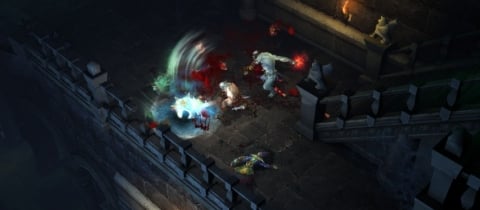Diablo 3's Authoritarian Service Is Dangerous For Gaming

After the past couple of weeks, one thing has become undeniably clear: always-on DRM for non-MMOs breaches dangerous territory. Not only are you subject to playing the game only in the way that the company allows you to play, you can't even play when you want to (i.e,. server outages, maintenance, lag spots, etc.,)
Diablo III's always-on was unfortunately met with a thunderous applause from the gaming community, record breaking sales, critically acclaimed review scores and gamers selling their rights as consumers for a brief tidbit of rented entertainment.
The tirade over the Diablo III Linux bannings set some people over the top with anger, while others were assuaged with Bashiok's comments that players don't get banned for playing on unsupported operating systems, just for cheating. The real issue, though, is that always-on dictates how you play, when you play and the way you play.
For MMOs we've come to terms of accepting that when playing with thousands of other people at the same time there are rules to abide by and play mechanics we have to learn to accept that not only alter the way we progress through the game (i.e., auction house) but also at what rate we progress (i.e., guilds, raid parties, etc.)
MMOs being always-on have become acceptable given the terms mentioned above, you're playing with others so we have to respect that. For non-MMOs...for single-player games with co-op or for strategy games with asynchronous multiplayer such as the upcoming SimCity, always-on becomes a completely different facilitator.
Blizzard tried peddling always-on not as a means to stop piracy (in their own words) but as a guard-dog against hacks, dupes and exploits, all of which occurred one way or another despite the game being always-on. The real reason for the always-on -- a feature that forces players to stay online in order to play Diablo III even in single-player mode -- is to protect Blizzard's middleman financial powerhouse known as the Real-Money Auction House.
In order to safeguard the RMAH, the always-on security measure has to monitor everyone who plays and how they play. The security known as 'Warden' looks for exploits, unsigned signatures, unregistered memory access and other technical tidbits that nefarious individuals might use or manipulate to exploit the system. A detection of any of the aforementioned results in a ban. In some cases it's justified, in other cases it turns into a battleground of client versus service provider.
CINEMABLEND NEWSLETTER
Your Daily Blend of Entertainment News

Right now there are a few players who are claiming they have been wrongfully banned, The Verge's Tracey Lien does a fine write-up on the individual case involving a player who claims he's been banned but hasn't received any specific details on why. Blizzard still has his $60 and refuses to refund the product because he broke the terms of service by using unsanctioned "third-party software", whatever that software may be.
Whether you agree or not with Blizzard on withholding information and maintaining the ban of a player while also refusing a refund is beside the point. The point is, a company can ban you indefinitely from a service you paid for any reason, just until you decide to lease a new license from them for the designated service fee, in this case $60.
Before jumping to the defense of Blizzard or EA or other companies over their decisions to implement always-on, think long and hard about this: you're losing access to play video games, a form of widely appreciated entertainment, in order for corporations to control what you play, how and when. They can turn the service off at any time to force you to buy their latest product or ban you without recourse or a detailed explanation at any time. They owe you nothing even when you paid in full.
Some gamers, blinded by adept devotion to these corporate behemoths, wave off these warning signs with retorts such as "Well, you shouldn't have signed the TOS, you shouldn't have agreed to the EULA, you shouldn't have accepted the private policy", etc., etc. Waiving your rights away as consumers to lease entertainment sounds like some kind of horrible future out of a Philip K. Dick novel, yet it's here, right now, facing us in the present as a true and horrid possibility for the future of all gaming culture.

Always-on DRM was viciously fought against tooth and nail by gamers when Ubisoft tried making it an industry standard. Their biggest mistake was not using an established enough property to peddle such a thing. But Blizzard managed to do just that with barely enough protest simply because they used a brand that gamers hold dear to heart as being one of the greatest gaming brands in existence...Diablo. Diablo II is still arguably the pinnacle of the ARPG genre and a sequel to such a lauded game was the perfect way for Blizzard to convince the industry that giving up your rights to own a game is okay so long as the game is attached to a beloved brand.
As gamers now know, you can never mod Diablo III. You'll never be able to play the game once Blizzard finally shuts down the servers. You can't play the game when your net service goes out or even in a friendly LAN match. You can never modify or tweak any aspect of the game without being permanently banned and losing all your entitlements and characters on your account. You can never create your own Diablo III experience outside of what Blizzard has offered you in your lease agreement.
For those of you willing to brush off mods, add-ons and custom game types as unnecessary facets to the industry, trying telling that to Bohemia Interactive who is nearing close to half-a-million sales in the span of nine weeks for Arma II, thanks to the alpha-mod DayZ. Or try telling that to Valve who is reaping huge profits from the Counter-Strike brand, originally a mod for Half-Life. How about telling that to Riot Games, makers of League of Legends, based on a mod for Warcraft 3. None of those above modding possibilities will ever happen for Diablo III, ultimately axing out a generation of user and community modding potential for one of the biggest selling games for PC.
Gaming is about entertainment and it reaches that goal by exploring a medium with creative freedom and ingenuity. Taking away those freedoms and restricting that ingenuity takes away everything that makes gaming great and it's hard for me to believe that any true gamer would willingly support a future where gaming as a service is preferred over gaming as a hobby.
Staff Writer at CinemaBlend.

I'm Not A Big Theme Park Guy, But The Star Trek And Back To The Future Creations For Universal Fan Fest Nights Look Super Impressive

Amid Oscars Race, Emilia Pérez Actress Karla Sofía Gascón Is In Hot Water Over Resurfaced Tweets

I Wasn't Sure We Needed Another High School Spidey Story, But Your Friendly Neighborhood Spider-Man Convinced Me Otherwise
Most Popular






